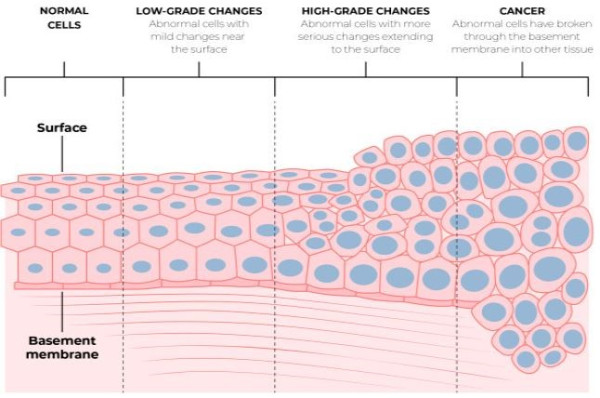About human papillomavirus (HPV)
About 4 out of 5 adults will have HPV at some time in their lives. It is spread through intimate skin-to-skin contact and any sexual activity. While HPV often clears up by itself, it can stay dormant in your system and may not be detected until years after you come into contact with it. If found in a test, this may not be due to a new exposure with HPV. This is why regular, ongoing screening is still important even if you have been with the same partner, or not been sexually active for sometime.
People with HPV usually:
- do not have symptoms
- do not know they have it
- have no problems or complications.
There are many different types of HPV, and some are more likely than others to lead to cervical cancer.
The body is pretty good at clearing the virus itself, usually within 2 years, especially in people under 30. However, sometimes it can persist and may develop into cervical cancer over time. 95% of cervical cancers are caused by HPV.
Grades of cervical changes
Cell changes on the cervix happen very slowly. There are many stages between HPV infection, cell changes and cancer.

About cervical cancer
Cervical cancer starts in the cells lining the cervix. This is triggered by cell changes usually caused by the human papillomavirus (HPV).
The cell changes caused by HPV may return to normal by themselves. In a small number of cases they develop into cancer if left untreated.
It is impossible to tell which abnormal cells will return to normal, and which may go on to become cancer. That is why regular screening tests are so important.
Other gynaecological cancers
There are 4 other types of gynaecological cancers that are currently not screened for:
- ovarian cancer
- uterine cancer
- vulval cancer
- vaginal cancer.
You can learn more about gynaecological cancers on the Talk Peach website.
Preventing HPV
With HPV immunisation and HPV testing, Aotearoa New Zealand aims to eliminate cervical cancer in the future.
Preventing cervical cancer
The HPV screening test is able to pick up cell changes very early. Most people will only need to have an HPV screening test every 5 years.
The HPV vaccine
Regular cervical screening, along with immunisation against HPV, is the best protection against cervical cancer.